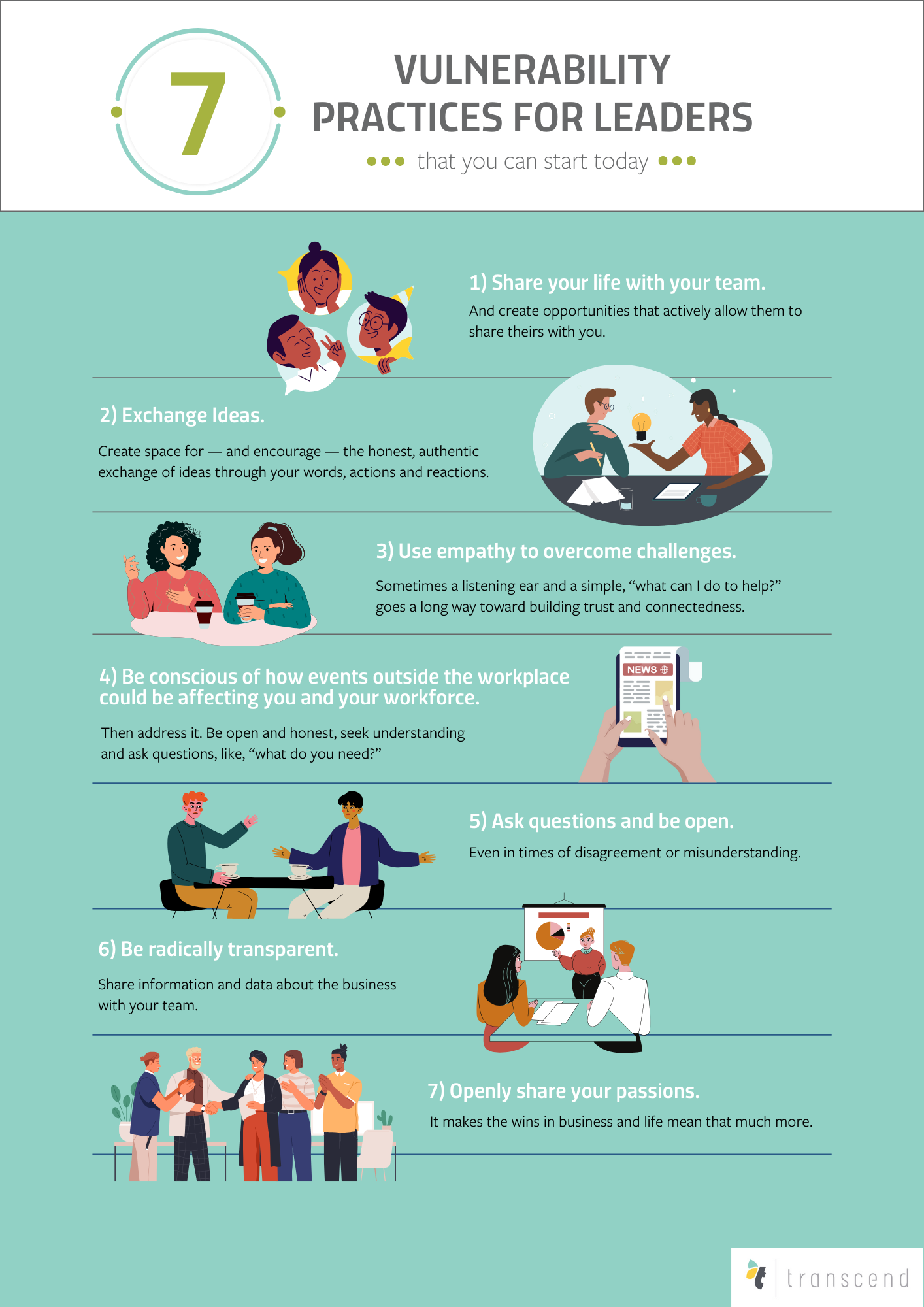
Ready for a confession?
At Transcend, we embrace crying at work. We’ve cried out of frustration, passion, hurt, or even tears of support. We’ve also cried alongside clients while they’ve processed complex emotions or celebrated wins in their business and personal lives.
For so long, the prevailing belief in the business world was that vulnerability equals weakness and unprofessionalism. In a performance-based system, leaders are historically expected to be stoic and void of emotion. While some leaders have bucked this stereotype in recent years, most still hold on to vulnerability as a shortcoming.
However, Brené Brown, a leading researcher on shame and vulnerability, offers us a different perspective on this powerful emotion. Her research has found that vulnerability is not only our “most accurate measure of courage” but “the birthplace of innovation, creativity, and change.” As we process the everyday challenges of work and life, as well as ever-evolving and changing global uncertainties, vulnerability in leadership is increasingly essential today and will continue to be in the future.
What is vulnerability, and what’s at stake when leaders aren’t vulnerable?
Vulnerability is not the same as emotionality. While that is a component, true vulnerability is about revealing our humanity. And we need more humanity in leadership. Our brains are programmed to recognize commonalities and differences to connect with those we feel are “safe.” We are wired to deduce threats quickly, including emotional ones, and our actions will follow. Many studies show that even our subconscious registers body language, micro-expressions, and gestures within seconds to evaluate who is on our side or not. By removing vulnerability from leadership, we fail to provide the human connection needed to build trust within business.
The most impactful way to lead with vulnerability is to recognize that we are all whole people coming into work with personal challenges and emotions. When leaders fail to create environments that allow employees and teammates to address their emotions in a vulnerable way—and when they don’t model this type of vulnerability themselves—the consequences are less productivity and more distraction for all.
But what about the old adage, “There’s no crying in baseball!” Many believe there’s no place for feelings in business. Studies show that a mere 10 minutes spent listening and empathizing with someone at work leads to higher productivity, more engagement, and an increased likelihood of that individual working better within a team. Because when we feel heard, we feel connected.
Therefore, humanity must remain in the workplace for it to thrive. Increased vulnerability enhances:
- Connectedness
- Trust
- Authenticity
- Empathy
- Idea exchange
- Risk-taking
These benefits, in turn, create more innovation, creativity, productivity, and a deeper sense of loyalty that leads to higher profits.
As leaders, it is vitally important that we exemplify vulnerability in the workplace and create safe environments where vulnerability is encouraged and modeled at the highest levels. We all have a unique story, backgrounds, and experiences to share, which is critical to engagement, productivity, and respect within the workplace.
How can you show up as a vulnerable leader today?
How can you start practicing vulnerability with your team right now? Here are seven practices you can implement at any time that will foster connection and build trust.


The Proof is in the Vulnerability
We’ll leave you with a story about how vulnerability can change the face of your business. Transcend delivered a strategic planning session with a team years ago. This leadership team was professional and buttoned up.
We came to the time in our facilitation where we talked about the power of the team and the part vulnerability plays in creating championship teams. As a part of the activity, team members came into the center of the circle to show their vulnerability. One of the leaders had just gone through cancer treatment, and when she entered the circle, she removed her wig. It was the first time she had presented herself without it to her colleagues.
That one act of bravery changed the entire dynamic of the strategy session. The connectedness, collaboration, and creativity of the team grew exponentially from that point on. But she would have never committed to this act of vulnerability if she hadn’t been given the space, opportunity, and encouragement to do so. The team would never have had the chance to transform itself through her gift.
You see, courageous acts of vulnerability are catalysts to rewards that cannot be fabricated through any other method of leadership. Only when we embrace the uniqueness of our humanity and all we have to offer, not just a percentage of it, can we demonstrate the power of unity and truly win in business and life.


